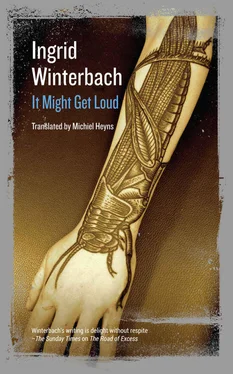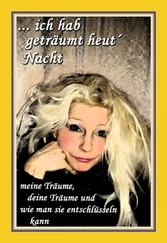They enter the third room — chamber, hall. Same size as the previous two, but with a different feel. Iggy described this room well: the wooden crosses against the wall like a cathedral from the land of the dead. And the pig’s head at the far end — the lord of the cloven-hoofed, Iggy called it, of which the Headman is the captain and the chief executive officer.
Karl stands gazing at the head for a long time. Fucking hideous: the dead eyes, the fang and the snout. If anything can spread contagion, it’s this abomination. The pope of the underworld, Iggy called it. He can imagine that this must have seemed like an evil place to Iggy. Poor Iggy. It’s here, he wrote, it’s in this space where his body was repeatedly mortified and subjected to all sorts of bestial practices — like that of a whore. Where irreparable damage was inflicted upon his body and soul under the eye of the pig — the very eye at which Karl is now looking with the greatest revulsion.
Karl realises that so far he’s not allowed himself to linger on the possible nature of these bestial practices. He has hitherto summarily dismissed any thought of it. He wasn’t going there. What Iggy alleged was bad enough, he wasn’t going to try and make a graphic representation of his allegations as well. And he doesn’t know how he can ask Jakobus about it either. But whatever the case, the truth must now be faced squarely.
‘The pope,’ he says, and tilts his head at the pig’s head on stilts, the atrocious thing with the dead eyes, ‘what’s Josias’s idea with it?’
Jakobus rolls another cigarette. He evidently always takes his time before replying.
‘It’s not perhaps used as a part of, well, all sorts of unholy goings-on, sort of perverse practices?’ Karl asks. ‘As in practices perhaps coupled with strange rituals.’
Jakobus sniffs. He half-smiles. ‘Well,’ he says. ‘You must understand. Josias’s interests and obsessions are not those of your average guy. Otherwise he would never in the first place have managed to get this place up and running and keep it going for all these years. But perverse practices — that, I must tell you, I don’t know. Perverse practices,’ and he utters a short chuckle. ‘Josias himself might find that quite an appealing description of his activities.’ And he laughs again, clearly amused at the idea. If Jakobus is so amused at the idea, there might just be a grain of truth to it, Karl thinks.
Now, God’s truth, he still doesn’t know. But suddenly he’s had his fill for the day. He does not want to see any more. He does not want to be shown one of the other rooms. He doesn’t want to see the woman in chains and the hanged man. He asks Jakobus to take him to Iggy’s room, and that’s that. Nothing more.
The view from here onto the mountain is beautiful indeed. There’s not much in the room, it looks a little like a monk’s cell. A bed, neatly made. An open wooden cupboard with a few largish boxes, two suitcases, containing a few pieces of clothing — of which some look suspiciously like women’s clothing. A wooden table with a clean surface, a mug, a plate, a few items of cutlery. Everything sparkling clean. A 500 gram tin of Ricoffy, a box with rooibos teabags. A kettle. A candle in a candlestick. A Bible. The typewriter on which he typed the letter to Karl. On the floor, a pair of women’s shoes — high-heeled — neatly lined up. On the wall, a small photo of their father.
‘Where are Ignatius’s paintings?’ he asks.
‘He burnt them all one morning. Josias was afraid he’d set fire to the whole place eventually. He threatened a fire that would destroy everything here.’
He doesn’t know why Iggy came here, he tells Jakobus. ‘What attracted him to this place?’
Jakobus reflects. First rolls a cigarette. ‘I don’t know,’ he says. ‘There is as much good as negative energy here. Sometimes it doesn’t take much to tip the scale.’
*
Jakobus says he’s welcome to overnight here in Iggy’s room. He declines politely but firmly. If he had to stay here, in Iggy’s room, with the little photo of their father on the wall, the scale might just tip for him as well.
*
He overnights in a hotel in the city and the next morning goes to visit Iggy in the institution. Hardly slept, he was so tense. Misery, he thinks. Misery with a capital M. And he hasn’t even seen Iggy yet.
It’s just as well that Juliana is in Johannesburg at the moment, and not here, because otherwise the temptation to get in touch with her would have been strong. That wouldn’t be a good idea, because if she were to see him in this God-awful condition, it would just mess up his chances with her even further.
Jakobus offered to accompany him, but he said it’s okay. He thinks it’s better if he goes on his own. Perhaps not too good for Iggy to see an emissary from the farm.
He announces himself at the hospital. Well, hardly a hospital. A psychiatric hospital — an institution for mentally disturbed people. With gardens and benches and God knows miles-long passages, and unfamiliar smells that don’t appeal to Karl: a blend of reheated food, Jik and medicine. He is accompanied by a nurse who takes him to Iggy’s room.
At the door he sends up a quick prayer: Please let it not be too bad.
Iggy is lying on his back in the bed. A drip in his arm for intravenous feeding. Steel cot. There is nothing in the room. Bars at the window, as in a jail. He is heavily sedated, says the nurse behind him. Karl asks if he can spend some time with his brother. Not too long, says the woman, turns on her sensible hard-soled heel, and closes the door behind her.
Karl walks up to the bed. On the bedside table are Iggy’s glasses.
‘Iggy,’ he says softly.
Iggy’s eyes are closed. He’s wearing striped hospital pyjamas; he looks so thin, so deathly pale. But his light hair is still growing thick and luxuriantly on his head. Pig’s bristle, their mother used to say when she rubbed her hand over Iggy’s head.
Karl bends over Iggy. Calls his name again softly.
‘Iggy,’ he says, a bit louder, and shakes him gently by the arm.
Iggy slowly half-opens his eyes. It looks as if it takes him a few minutes to focus. Then he recognises his brother. (Oh joy. Karl feared that he might be too far gone.) Iggy smiles slightly — such a forlorn, tremulous little smile. He tries feebly to sit upright slightly, but he’s too heavily sedated and falls back on the pillows. He tries to say something, but his tongue is heavy, he can’t shape the words. He closes his eyes again.
‘I’m here,’ says Karl. ‘You needn’t worry any more, Iggy, you must just get better.’
Iggy opens his eyes slightly again and tries to say something.
Karl sits down on the bed by his brother. Now a torrent of words is released in him — all the anxiety, all the pent-up fear and resistance of the last few days.
‘Iggy,’ he says, ‘I’m sorry it’s taken me so long to get here. I should probably just have flown down. There were all sorts of unnecessary interruptions on the way. I’ll tell you one day. All kinds of bizarre things cropped up. But now I’m here. I met Josias Brandt and Jakobus Coetzee. I don’t know about Josias, I truly don’t know, but Jakobus is very supportive. He showed me your room and so on. Lovely view of the mountain. Sorry — I shouldn’t even mention that place now. I read your letter, Iggy. It must have been terrible, the things you went through. You should have let me know sooner. We could have made a plan to get you out of there. But don’t worry about it, you’ll never go back there. The Headman and whoever else are something of the past. It’s over. That chapter is closed. Nobody will torment you again.’
Iggy lies motionless, only his hands twitch from time to time. Sometimes it looks as if he’s on the point of opening his eyes, but as if the exertion is too great.
Читать дальше












